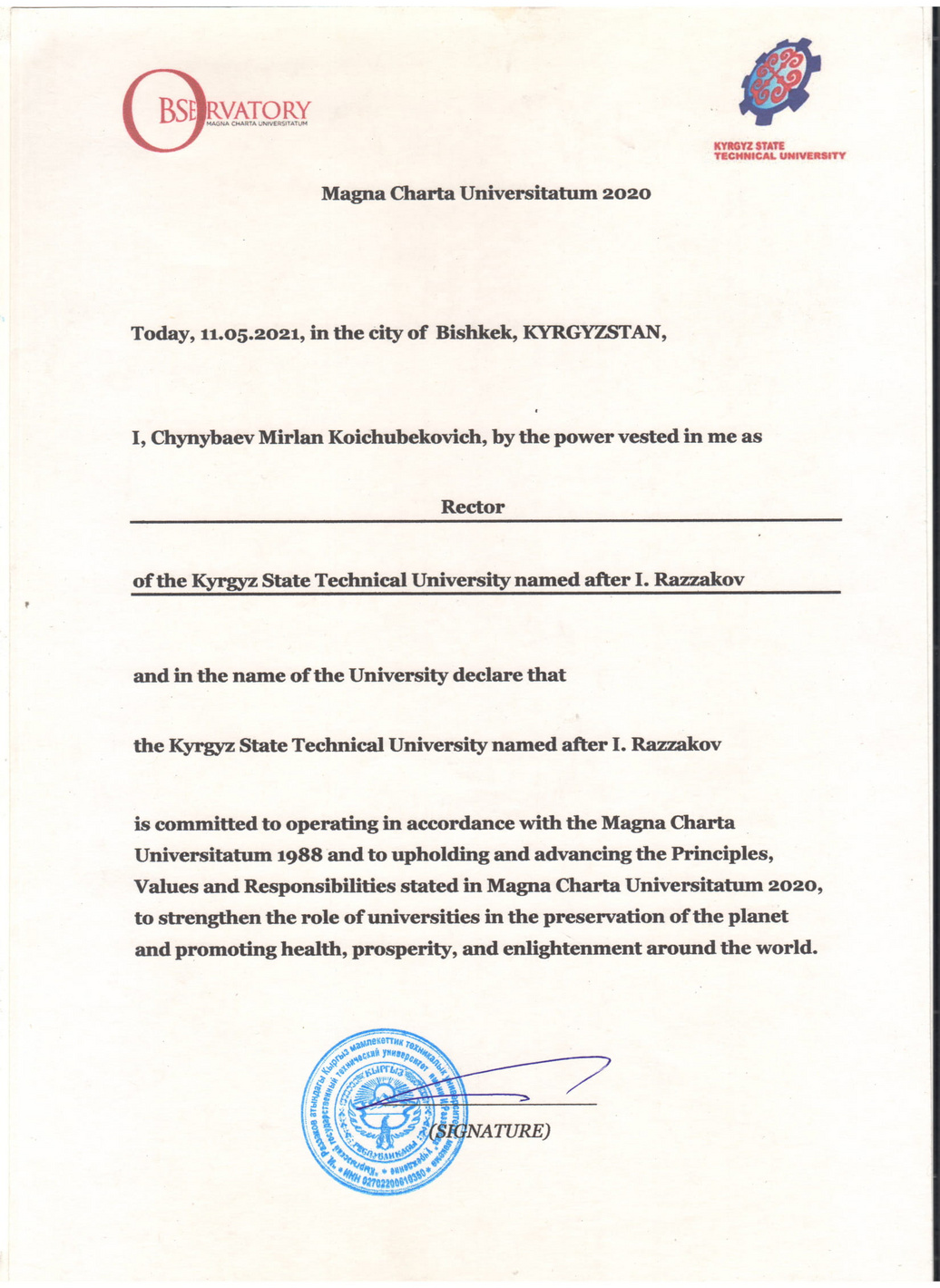MAGNA CHARTA UNIVERSITATUM
In May 2021, the video signing of the Great Charter of Universities by the rector of KSTU named after I. Razzakov.

The Magna Carta of Universities was first signed by KSTU in September 2011 in Bologna, Italy, where more than 500 rectors of major universities from all over the world participated. Currently, 904 universities from 88 countries of the world have joined the Magna Carta of Universities.
The Magna Carta of Universities is a document that contains the principles of academic freedom and institutional autonomy as a guideline for effective governance and self-understanding of universities in the future.
PREAMBLE
The undersigned university rectors, who met in Bologna on the occasion of the Ninth Century of the oldest of them, four years before the final abolition of the borders between the countries of the community, bearing in mind the prospect of increased cooperation among all European peoples, convinced that peoples and states must today, more than ever prioritize the role that universities will be called upon to play in a society that is changing and opening up internationally, express the conviction that:
• the future of humanity on the threshold of the third millennium largely depends on the cultural, scientific and technological development that takes place in those centers of culture, knowledge, research, which are real universities;
• the task of disseminating knowledge among new generations, which universities should take upon themselves, means today that they are obliged to appeal to the whole society, whose cultural, social and economic future now requires a special, significant and constant contribution to the cause of education;
• universities should provide future generations with education and upbringing, which would promote respect for the great harmony of the environment and life itself.
Therefore, we proclaim to states and peoples the basic principles by which from now and in the future universities should be guided.
BASIC PRINCIPLES WHICH UNIVERSITIES SHOULD BE FOLLOWED:
1. The university operates within societies with different organization, which is the result of different geographical and historical conditions, and is an autonomous institution that critically reflects and disseminates culture through research and teaching.
To meet the requirements of the modern world, in his research and teaching activities, he must have moral and scientific independence from political and economic power.
1. The educational process at universities should be inseparable from research activities so that teaching at the same time is at a level that meets the evolution of both the needs of society and the requirements for scientific knowledge.
2. Since freedom of teaching, research and learning is a fundamental principle of the life of universities, both public authorities and universities must, within their competence, guarantee this and promote compliance with such a priority requirement.
Rejecting intolerance and being constantly open to dialogue, the university becomes, therefore, the most preferred meeting place between teachers who have the ability to transfer knowledge and possess the means to deepen it through research and search for new things, and students who have the right, desire and ability to enrich themselves with this knowledge.
1. Being the keeper of the traditions of European humanism, but in a constant striving to achieve universal knowledge, the university, fulfilling its function, overcomes political and geographical boundaries and affirms the urgent need for mutual knowledge and interaction of different cultures.
METHODS
The realization of these goals in the light of the above principles requires the availability of effective tools that are appropriately suited to the current situation.
1. To ensure freedom of research and teaching, all members of the university community must be provided with the necessary means to achieve this goal.
2. The selection of professors and the determination of their status should take place in accordance with the principle of the inseparability of research and teaching.
3. Each university, taking into account the specifics of the circumstances, must guarantee its students the preservation of freedoms and the necessary conditions for them to achieve their cultural and educational goals.
4. Universities - especially European ones - consider the mutual exchange of information and documentation, as well as the increase in joint research projects as the main means of constant progress of knowledge. To this end, as was the case at their inception, they stimulate the mobility of teachers and students and believe that a common policy on the issue of equivalence of status, titles and examinations, although with respect for national diplomas and in the presentation of scholarships, constitutes the main means of guaranteeing fulfilling their mission today.
The undersigned rectors, on behalf of their universities, undertake to do everything in their power to ensure that each state and interested supranational organizations can rely even more on the provisions of this Charter, which is the unanimous expression of the autonomous will of each university.




